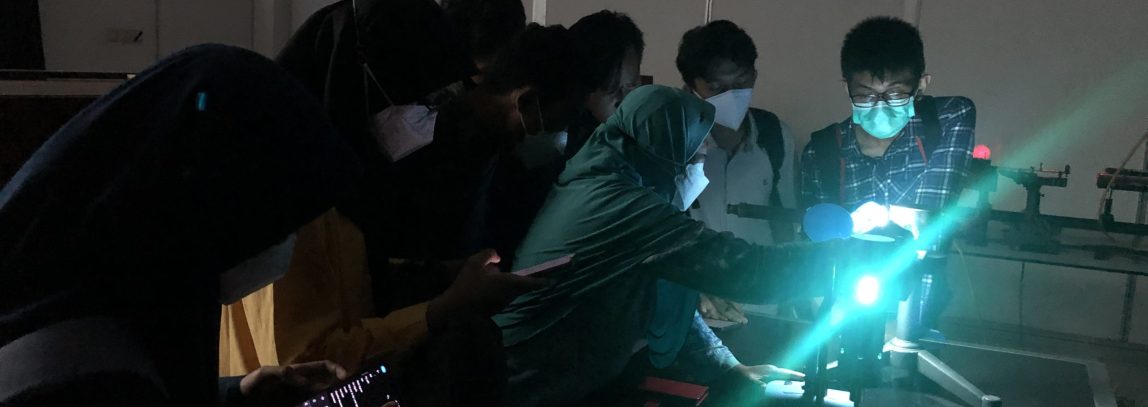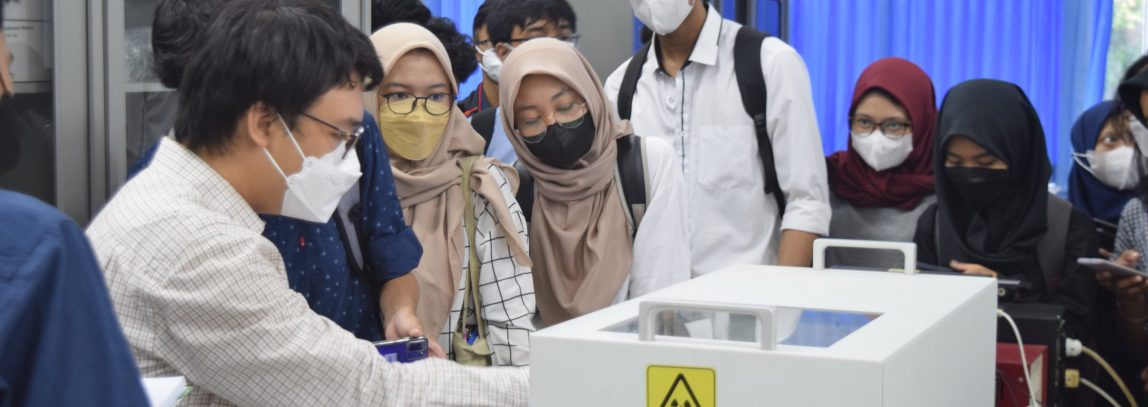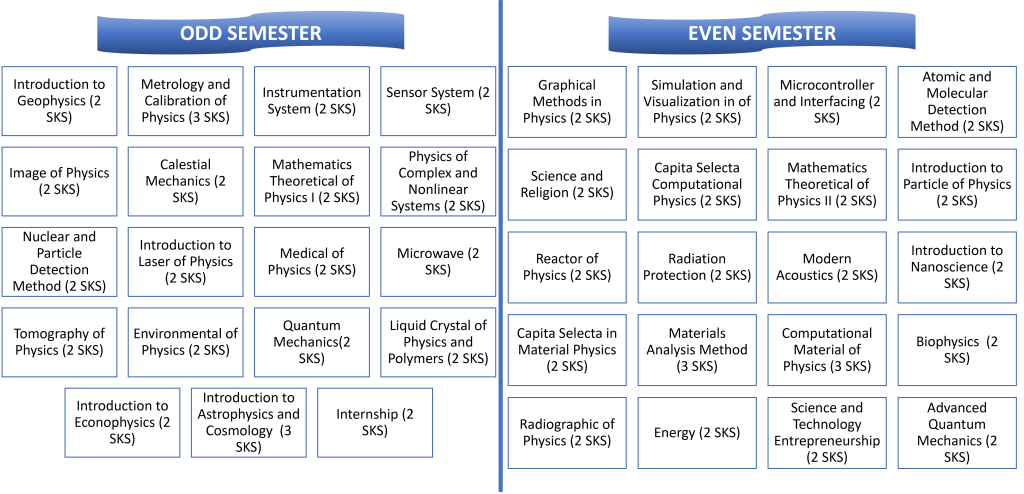Bachelor of Physics Study Program Identity
| Study Program | Bachelor of Physics |
| Department | Physics |
| Faculty - University | Faculty of Mathematics and Natural Sciences - Universitas Gadjah Mada (UGM) |
| Number and Date of Establishment Decree | 22/DIKTI/Kep/1985 , May 1st 1985 |
| Month and Year Started | September 1st ,1956 as a Physics major or May 1st , 1985 as a Physics Study Program |
| Final Accreditation Rating (Score). | Excellent |
| Accreditation Decree Number | 1226/SK/BAN-PT/Akred/S/IV/2019 |
| Address | Department of Physics, Faculty of Mathematics and Natural Sciences UGM, North Sekip, Bulaksumur BLS 21, Yogyakarta 55281 |
| Phone & Fax. Number | (0274) 545 185 |
| Homepage & E-mail | https://fisika.fmipa.ugm.ac.id/s1-fisika/ |
Certificate of Accreditation from Lembaga Akreditasi Mandiri Sains Alam dan Ilmu Formal (LAMSAMA)
(Download)
Vission :
The vision of the physics study program is that in 2037 it will become a physics undergraduate study program that is superior nationally and is known internationally in the field of education and teaching for the glory and prosperity of the Indonesian people and mankind in general.
Mission :
- Organizing education and teaching programs in Physics based on a quality management system that meets national and international standards which produce graduates with a bachelor’s degree (S1) in Physics who are competent, active in community development efforts, creating prosperity and improving community civilization, and able to continue to education level higher (S2 and S3).
- Organizing education and teaching of Physics that is oriented to the development of advanced science and technology that is beneficial to human civilization.
- Organizing integrated physics education and teaching in various community service activities to help in achieving the nation’s welfare.
The vision and mission of the BP-Phys is in line with the vision and mission of FMIPA and the Physics Department, which is then carried out with the educational objectives of the bachelor program in physics (PEO, Program Educational Objectives) as follows:
PEO-1. Produce Bachelors in the field of Physics who believe and fear God Almighty, have high integrity and personality, are open and responsive to changes, scientific advances and problems faced by society, especially those related to their fields of expertise, and international quality.
PEO-2. To produce Bachelors in Physics who have superior abilities to be able to study at an advanced level at national and international levels.
PEO-3. To produce knowledgeable and skilled personnel for centers of excellence in education, research and community service based on physics and its applications which are known and recognized at the national and international levels. the national and international levels.
PEO-4. To produce Bachelors in Physics who are competent, qualified, with national and international insight, and able to work together, to encourage the growth of community welfare and the advancement of world civilization.tion.
Programme Learning Outcomes (PLO) - Bachelor of Physics
| Aspect | Code | Programme Learning Outcomes (PLO) |
|---|---|---|
| Attitude | PLO1 | Have faith and fear of God Almighty, apply good morals, ethics, initiative, and responsibility in completing their duties. |
| Knowledge | PLO2 | Able to explain theoretical concepts and principles of classical and modern physics, and be able to apply the basic concepts of physics and related mathematical methods in finding a solution to a physical problem. |
| General Skills | PLO3 | Able to communicate the results of research on problems and physical behavior both in writing and verbally, as well as being able to lead and collaborate at various levels of roles in a team. |
| Special Skills | PLO4 | Able to design and carry out experiments/theoretical reviews, able to identify a physical problem based on the results of observations and experiments, and able to operate related technology. |
| Long Life Learning | PLO5 | Able to analyze various existing alternative solutions to physical problems and conclude them for making the right decisions, both in familiar and new problems. |
Matrix Correlation Course to PLO
(Download)
In the 2021 curriculum, the number of credits of compulsory courses for the Physics Undergraduate Study Program is 100, which is 15 credits less than in the 2016 curriculum. To achieve the optimal and relevant learning outcomes students have a freedom to choose the minimum of 144 credits and maximum of 148 credits, according to their interests, at least 44 credits are elective courses or other activities that are suitable with learning outcomes.
The Physics Study Program Undergraduate Program determines several study materials to achieve the desired graduate competency standards. In general, the study material in the 2021 curriculum includes the basics of attitudes, university values, and conceptual aspects related to natural phenomena and their supporting tools. This study material that develops conceptual aspects related to natural phenomena and their supporting tools is a direct derivative of the knowledge and skills aspects of the CPL Physics Study Program.
The development of conceptual aspects can be carried out if the fields related to the theoretical concepts of physics and their supporting tools are mastered. Mastery of the theoretical concepts of physics includes mastery of the concepts and principles of the main branches of physics, namely classical mechanics, quantum mechanics, electromagnetics, statistical physics, atomic and molecular physics, nuclear and particle physics, condensed matter physics, imaging physics, gravity and cosmology, as well as science of philosophy. Mastering the theoretical physics concepts can be achieved if the relevant tools are also developed. These supporting tools are information acquiring , measuring, modeling, and phenomena analyzing which are taught theoretically, computationally, and experimentally.
In addition to the main branches of physics, the fields of study in the Physics Study Program in the Physics Department also concern to specific topic in physics which is related to the expertise of the faculty member. The field of expertise seeks to understand the natural phenomena from the point of view of specific skills. These areas of expertise also collaborate to gain a complete understanding of the natural phenomena that occur in universe. These areas of expertise are:
- Theoretical physics and mathematics which studies : cosmology, particle physics, and mathematical formulas for natural phenomena.
- Computational physics which studies : complex systems, emergent quantum material spectroscopy, first principle calculation based on Density Functional Theory (DFT), particle interactions in the matter, and computational physics for education and teaching.
- Optical and acoustics spectroscopy which studies : photo acoustics for medicine, thermo-acoustics, and acoustic energy harvesting.
- Imaging and medical physics which studies : Radiography and Computed Tomography (CT) Scans with gamma rays and X-Ray (ionizing radiation), Optical Coherence Tomography (OCT) with lasers (non-ionizing radiation), and magnetic interactions with organic or body tissue.
- Functional materials which studies : development of biomaterial systems, development of multifunctional materials based on nanoscience and nanotechnology and their applications ( for example sensors, supercapacitors, magnetic nanoparticles, nanofibers, photocatalysts, etc.), computational material design (CMD) for prediction of novel-functional materials.
- Instrumentation which studies : metrology and calibration, sensor systems, data acquisition, and artificial intelligence systems.
A complete academic guidance module can be download from following link :
List of Judicium Requirements
 Loading...
Loading...
Flowchart of MBKM
DPA permission letter to be uploaded in PreKRS
Weekly Logbooks
Summary Report
Organizational Structure













